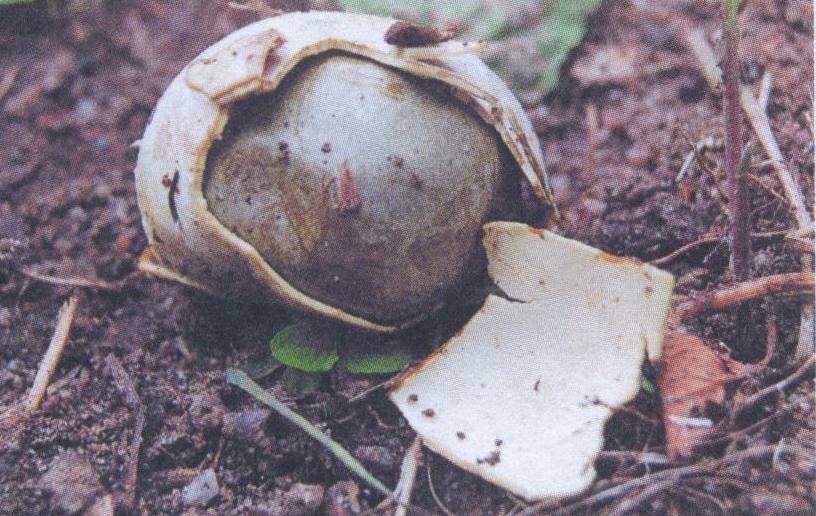Mycenastrum leathery (Mycenastrum corium)
- Division: Basidiomycota (Basidiomycetes)
- Subdivision: Agaricomycotina (Agaricomycetes)
- Class: Agaricomycetes (Agaricomycetes)
- Subclass: Agaricomycetidae (Agaricomycetes)
- Order: Agaricales (Agaric or Lamellar)
- Family: Agaricaceae (Champignon)
- Genus: Mycenastrum (Mycenastrum)
- Type: Mycenastrum corium (Mycenastrum leathery)

fruiting body:
spherical or flattened-spherical. Sometimes the fruiting body has an ovoid, elongated shape. The diameter of the fruiting body is about 5-10 centimeters. At the base there is a thick root-shaped cord of mycelium, which is covered with a dense layer of grains of sand. Later, a tubercle forms at the site of the cord.
Exoperidium:
at first white, then yellowish and even later greyish, thin. As the fungus matures, the exoperidium breaks into scales and falls off.
Endoperidium:
first fleshy, up to three millimeters thick, then brittle, corky. In the upper part, the endoperidium cracks into irregular lobed parts. Painted in light brown, lead gray and ash brown.
Soil:
at first, the gleba is whitish or yellowish, compact, then it becomes loose, powdery, olive in color. Mature mushrooms have a dark purple-brown gleba without a sterile base. It does not have a pronounced taste and smell.
Disputes:
warty, spherical or ellipsoid light brown. Spore powder: olive brown.
Spread:
Leathery Mycenastrum is found in forests, deserts, pastures, and more. Mainly in eucalyptus groves. Prefers well-drained soils rich in nitrogen and other organic matter. Relatively rare, rarely seen. Fruiting in spring and summer. It mainly lives in the desert or semi-desert zone. Remains of last year’s endoperidium are sometimes found in spring.
Edibility:
a good edible mushroom, but only at a young age, while the flesh retains elasticity and white color. The taste of this mushroom is equated to fried meat.
Similarity:
all mushrooms of the genus Mycenastrum have spherical or flattened fruiting bodies, with a characteristic mycilial strand at the base, which breaks off as the fruiting body ripens, leaving only a tubercle. Therefore, Leathery Mycenastrum can be mistaken for almost any mushroom of this genus.









